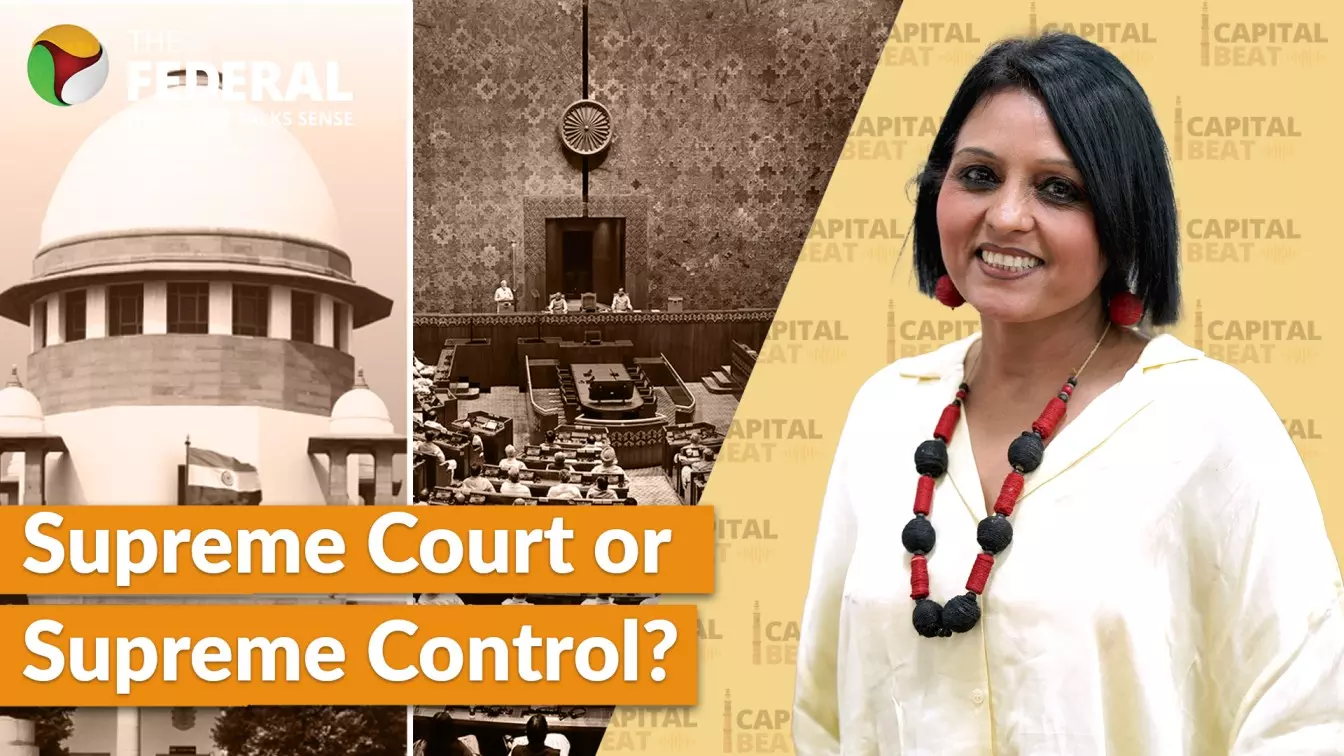
Dhankhar’s critique of judiciary: Simple outburst or executive overreach?
The Federal’s Capital Beat decodes the vice president’s recent outburst at the judiciary and why its origin may lie in Dhankhar’s political leanings

In this episode of Capital Beat, former Lok Sabha secretary general PDT Achary and The Federal’s political editor Puneet Nicholas Yadav joined Neelu Vyas to unpack Vice President Jagdeep Dhankhar’s sharp critique of the judiciary. The discussion focused on Dhankhar’s recent comments calling Article 142 a “nuclear missile” and questioning the judiciary’s power to direct the president, raising concerns about constitutional propriety and potential pressure on the courts.
Dhankhar’s dig at judiciary
Dhankhar’s remarks have stirred a political and constitutional storm. Referring to the Supreme Court's order on the Tamil Nadu governor's delay in clearing Bills, Dhankhar questioned whether the judiciary can direct the president and warned against judges acting like a “super Parliament.”
“So we have judges who will legislate, who will perform executive functions, who will act as super Parliament, and have no accountability,” Dhankhar had stated.
PDT Achary viewed these remarks as a strong rebuke to the judiciary. However, he noted that Article 142 is a constitutional provision designed to ensure complete justice, a core principle of democracy.
Role of Article 142
Achary elaborated that Article 142 empowers the Supreme Court to provide relief beyond ordinary legal remedies when justice demands it.
“Article 142 is an extraordinary provision meant for doing complete justice. That’s why it’s vested solely in the apex court,” he said.
He clarified that in the Tamil Nadu case, where 10 Bills were kept pending by the governor for over five years, the Supreme Court acted within its mandate by deeming them passed and invoking Article 142 to resolve a prolonged constitutional impasse.
Political undertones
The Federal’s political editor Yadav strongly criticised Dhankhar’s comments, calling them “unfortunate” and “possibly unconstitutional in spirit.” He said the vice president, despite his legal credentials, seems to be aligning more with political rhetoric than constitutional decorum.
“Article 142 hasn’t come from somewhere else—it comes from the Constitution. The judiciary is not functioning outside the constitutional framework,” Yadav pointed out.
He also observed that Dhankhar’s tenure has seen repeated attempts to undermine judicial authority, starting from his early criticisms of the NJAC ruling to recent suggestions that constitutional amendments shouldn’t be reviewable by courts.
Pressure on judiciary?
Vyas raised the possibility of these statements being seen as pressure tactics. While Achary doubted the legal basis for a contempt of court charge, he emphasised that the judiciary is resilient and not new to political criticism.
“This is not the first time politicians have attacked the judiciary. But historically, the judiciary has stood firm in its role to safeguard the Constitution,” he said.
He cited past precedents, especially during the Emergency, where courts played a crucial role in preserving constitutional principles.
Erosion in constitutional balance
Yadav noted the disturbing pattern of executive overreach, questioning whether Dhankhar's role as Rajya Sabha Chairman is being politicised.
“The vice president ends up making statements that sound like they’ve come straight from WhatsApp forwards supporting the ruling party,” he said.
He warned that this blurs the lines between institutional responsibilities and partisan interests, undermining the sanctity of high constitutional offices.
Political ambitions?
As the conversation wrapped up, questions arose about the political motivations behind Dhankhar’s statements. While Yadav refrained from speculating on Dhankhar’s aspirations, he highlighted the alignment of his views with the current political establishment.
“It’s unfortunate that the vice president is unable to differentiate between political speech and the dignity of his office,” Yadav concluded.
The content above has been generated using a fine-tuned AI model. To ensure accuracy, quality, and editorial integrity, we employ a Human-In-The-Loop (HITL) process. While AI assists in creating the initial draft, our experienced editorial team carefully reviews, edits, and refines the content before publication. At The Federal, we combine the efficiency of AI with the expertise of human editors to deliver reliable and insightful journalism.

